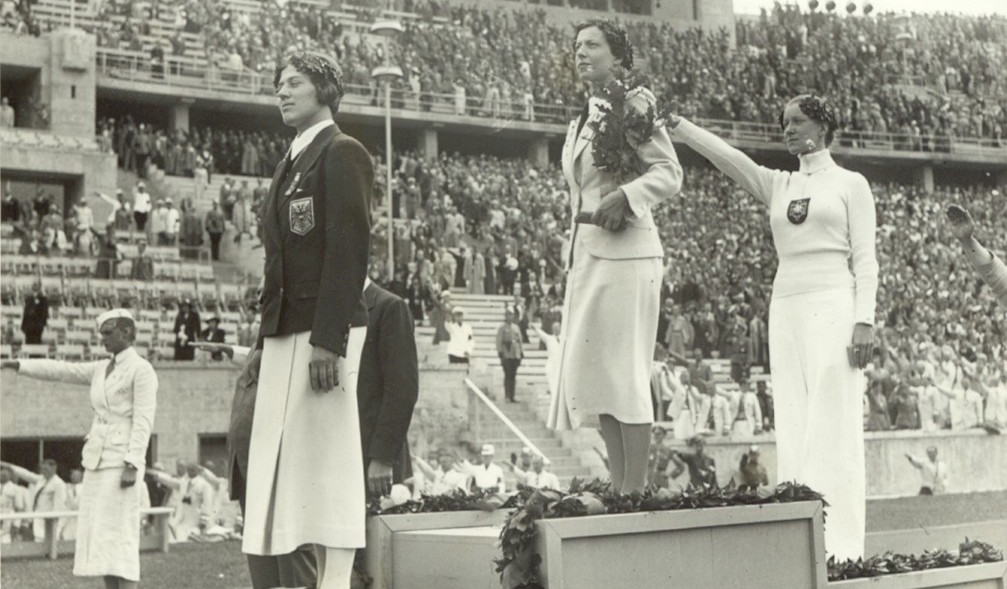Once a month here on the Molten Sulfur Blog, I run content taken from our book Archive: Historical People, Places, and Events for RPGs. This post is one of eighty entries in Archive, each more gameable than the last!
This post is brought to you by beloved Patreon backer Justin Moor. Thanks for helping keep the lights on! If you want to help keep this blog going alongside Justin, head over to the Patreon page – and thank you!

1936 Olympics in Berlin
The Political Games
In 1931, the International Olympic Committee awarded Berlin the privilege of hosting the 1936 Summer Olympics. Two years later, Adolf Hitler became chancellor of Germany and began persecuting Jews, Roma (gypsies), political opponents, and others. The Nazi’s control claimed all aspects of German life, including sports. The sports imagery in 1930s Germany tried to promote the myth of Aryan racial superiority and physical prowess. Even artwork reflected Nazi propaganda with sculptures erected with well-developed muscle tone, heroic strength, and accentuated Aryan features. The Olympics wouldn’t escape such propaganda either.
In April of 1933, non-Aryans – Jews, individuals with Jewish parents, and Roma – were systematically excluded from German sports facilities and institutions. This policy expelled professionals like a light heavyweight boxing champion, Germany’s top-ranked tennis player, and a world-class high jumper from both professional and Olympic teams. Some athletes flocked to separate associations that would accept them, but many of the alternative sports facilities were not comparable to well-funded German groups. The boxing champion would eventually continue his career in the United States.
There were movements to boycott the 1936 Olympics in the United States, Great Britain, France, Sweden, Czechoslovakia, and the Netherlands. Some protestors suggested a Counter-Olympics, and they planned a “People’s Olympiad” for the summer of 1936 in Barcelona. Fascism stopped this one too, as it was canceled after the outbreak of the Spanish Civil War. Regardless, many Jewish organizations supported a boycott, and even pressured Jewish athletes to boycott as well.
Though international opinion didn’t favor having the Olympics in Berlin after Hitler rose to power, the sponsoring athletic and Olympic organizations of the United States and other western democracies rejected a proposed boycott of the Games. To placate global critics, star fencer Helene Mayer was allowed to represent Germany at the Olympic Games. She was viewed as non-Aryan because her father was Jewish. She ended up winning a silver medal, and like all other medalists for Germany, she gave the Nazi salute on the podium.
Though no other Jewish or any Roma athletes competed for Germany, Hitler tried to camouflage his racist, militaristic character while hosting the Summer Games. The regime was trying to exploit the Games to give many foreign spectators and journalists an image of a peaceful, tolerant Germany. Most anti-Jewish signs were temporarily removed and newspapers toned down their racist rhetoric. Many tourists for the Games were unaware that just prior, some 800 Roma in and around Berlin were arrested and put under police guard in a camp in a Berlin suburb. Nazi officials ordered that foreign visitors not be punished for violating German anti-homosexuality laws. These policies did well enough that most athletes didn’t fully grasp the extent and purpose of Nazi persecution of Jews and other groups at the time. While Germany held a veil of peace and tolerance, the Olympics were promoted with colorful posters and magazine spreads often promoting heroic, blue-eyed blonds with finely chiseled features. All of which were meant to draw a link between Nazi Germany and ancient Greece, symbolizing the Nazi racial myth of Aryan superiority.
After the politically charged Summer Games, Hitler pressed on with grandiose plans for German expansion. Persecution resumed. Non-Aryans were dismissed from military service. Two days after the Olympics, the head of the Olympic village committed suicide when he was cashiered from the military due to his Jewish ancestry. Then, in just three years, the supposedly hospitable and peaceful sponsor of the 1936 Olympic Games unleashed World War II with the German invasion of Poland.
1936 Olympics in Play
The Summer Games could be delicate even in a campaign, where making the wrong move could spark major backlash. If the party is working for a foreign government, they could be sent to rescue a fellow citizen whose German family is being held hostage to force her to compete for Germany. PCs may want to show the world the true face of the German government while the world’s eyes are on Berlin. They might crash a major medal ceremony with a gang of malnourished, rescued political prisoners willing to risk death to expose the crimes of the state. The 1936 Olympics is also the perfect event for a time-traveling party to alter the course of history. At this point in time, Hitler is more exposed, and the PCs could be sent on a mission to assassinate him before the Holocaust can ever happen. Finally, you could introduce the Games as a complication. The PCs have something unrelated they need to do at a particular time and place, which happens to coincide with your setting’s version of the 1936 Olympics. This could lead to interesting consequences. The Games mean more security and more bystanders, but it also means the authorities won’t be able to be overt in their response to the PCs’ actions. As long as the eyes of the world are upon your Germany-analogue, the government must pretend nothing is wrong. On the other hand, the authorities’ clandestine response might be even harsher than expected, as a reprisal.






